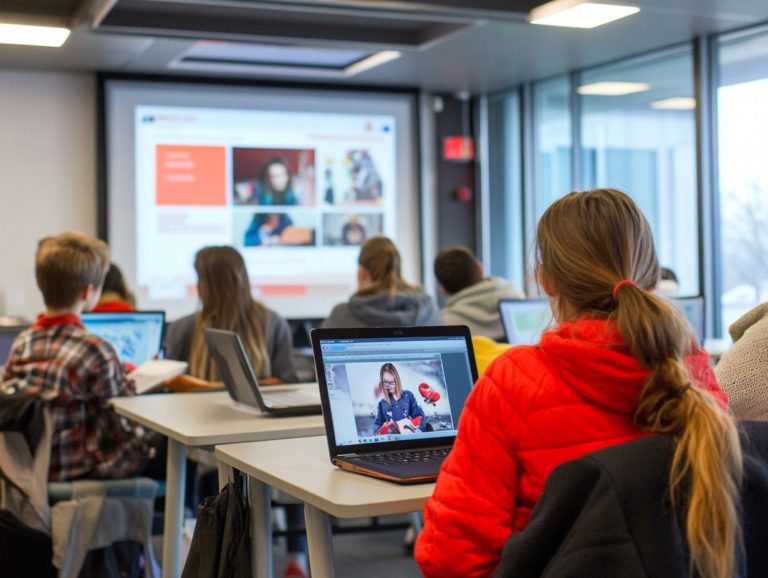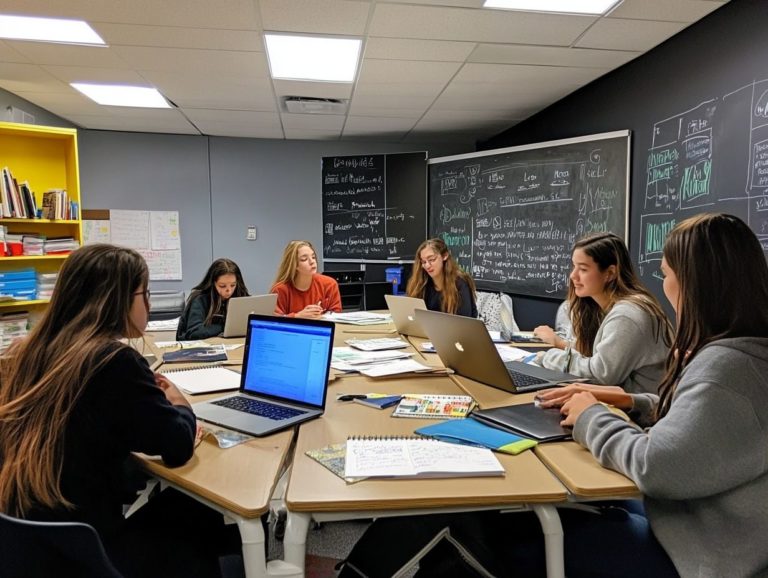top language courses that include cultural lessons
Discovering a new language transcends the mere acquisition of vocabulary and grammar; it invites you to immerse yourself in the vibrant tapestry of culture that surrounds it.
This article delves into the premier language courses that seamlessly intertwine language learning with cultural experiences. Whether you re drawn to Spanish, French, Mandarin, or Arabic, each course presents unique opportunities to engage with local traditions, cuisine, and customs.
Explore how these cultural dimensions enrich your language journey, transforming learning into an unforgettable experience.
Contents
- Key Takeaways:
- 1. Spanish Language Courses with Cultural Immersion
- 2. French Language Courses with Cultural Activities
- 3. Italian Language Courses with Cultural Excursions
- 4. Japanese Language Courses with Cultural Workshops
- 5. Mandarin Chinese Language Courses with Cultural Events
- 6. German Language Courses with Cultural Experiences
- 7. Arabic Language Courses with Cultural Tours
- 8. Russian Language Courses with Cultural Festivals
- 9. Portuguese Language Courses with Cultural Traditions
- 10. Korean Language Courses with Cultural Cuisine
- Why Is It Important to Learn About Culture When Learning a Language?
- Frequently Asked Questions
- What are the top language courses that include cultural lessons?
- Why is it important to learn about culture while learning a new language?
- Are there any specific cultural lessons included in these language courses?
- Do these courses offer interactive cultural activities?
- Are these courses suitable for beginners?
- Can I access these courses online?
Key Takeaways:
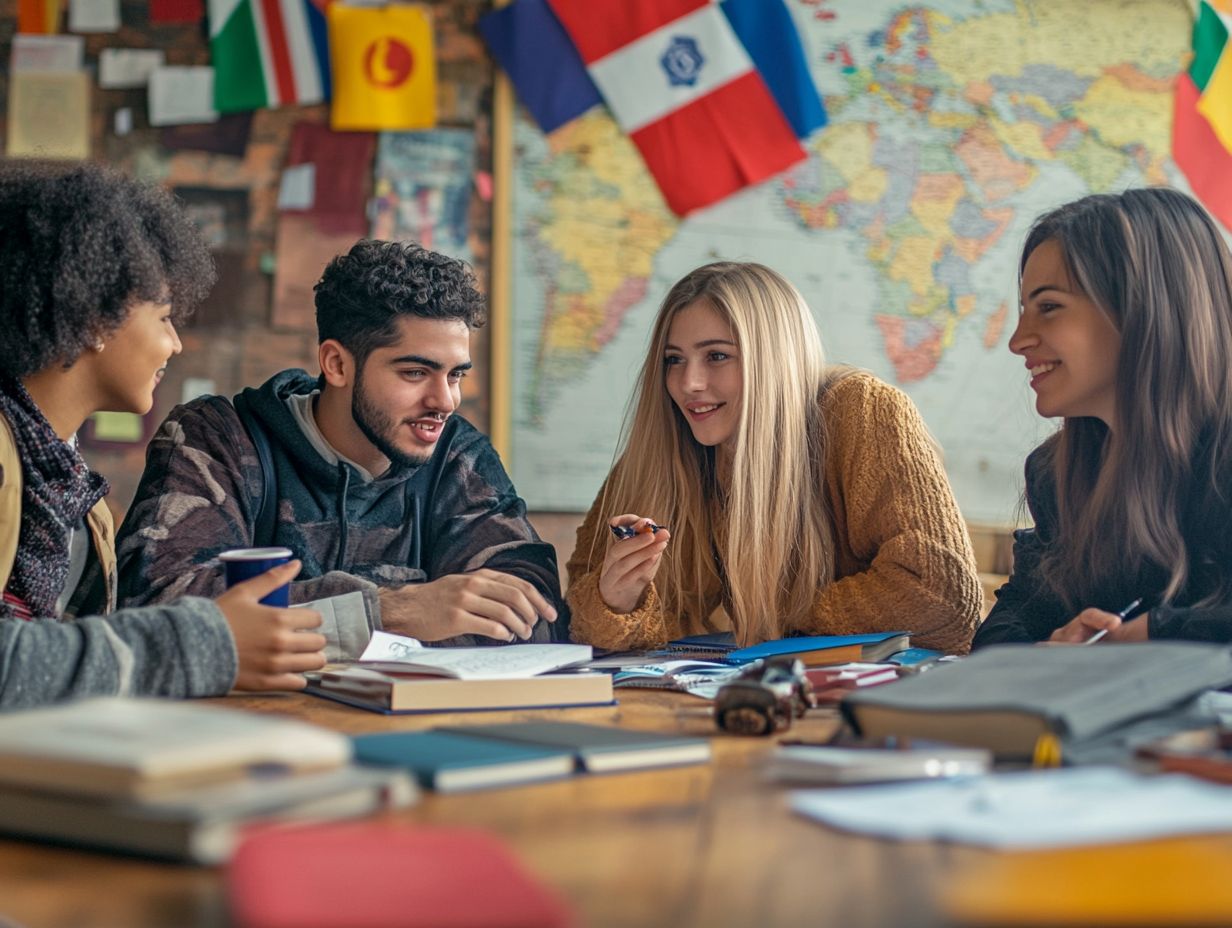
Experience the true essence of a language by immersing yourself in its culture through activities, workshops, and excursions. Combining language and cultural learning enhances communication skills and provides a deeper understanding of a language’s nuances. From traditional festivals to trying authentic cuisine, cultural activities in language courses offer a unique and enriching learning experience.
1. Spanish Language Courses with Cultural Immersion
Spanish language courses that prioritize cultural immersion offer an enriching experience, blending language acquisition with an understanding of culture. This method helps you learn vocabulary more easily while appreciating the subtleties of Spanish-speaking cultures.
These courses feature interactive tools that promote engagement and retention. You ll find bite-sized lessons that present content in digestible portions, making it easier to grasp new concepts.
Engaging in cultural activities like cooking classes featuring traditional recipes and virtual tours of historic landmarks deepens your understanding and appreciation of the contexts in which the language flourishes.
By interacting with native speakers and participating in local community events, you sharpen your language skills and cultivate a sense of belonging and connection to the vibrant cultures you explore.
2. French Language Courses with Cultural Activities
French language courses enriched with cultural activities provide a distinct pathway to mastering the language. This approach integrates practical language skills with engaging content, enhancing your understanding of French customs and traditions.
Immerse yourself in a variety of cultural experiences, such as:
- Cooking classes where you learn delightful recipes and acquire culinary vocabulary, deepening your appreciation for French gastronomy.
- Art workshops that involve hands-on interaction with artistic concepts, allowing you to discuss renowned artists and movements in French.
- Film screenings that serve as entertaining and educational tools, exposing you to colloquial expressions and authentic dialogues.
These cultural activities harmonize beautifully with grammar quizzes and vocabulary exercises available through language apps, ensuring that you can effectively connect your classroom knowledge with real-world application.
3. Italian Language Courses with Cultural Excursions
Italian language courses that include cultural excursions offer an immersive experience that elevates your learning. You ll practice the language in real-world contexts while savoring Italy’s rich heritage.
Excursions often take you to historical sites like ancient ruins, art museums, and iconic landmarks, providing a captivating glimpse into the country s storied past. Imagine indulging in culinary experiences such as cooking classes or wine tastings not only will your taste buds be delighted, but you ll also find opportunities to use the language practically.
Engaging with local festivals allows you to experience authentic traditions while conversing with native speakers, reinforcing your vocabulary and grammar skills in a vibrant atmosphere. Incorporating spaced repetition and short lessons before and during these activities ensures that your language acquisition is effective and enjoyable, fostering deeper connections with both the language and its culture.
Ready to dive into a new culture while learning a language? Start your journey today and discover the joys of learning a new language!
4. Japanese Language Courses with Cultural Workshops
Japanese language courses with cultural workshops help you improve your language skills and explore Japanese culture.
Engaging activities like calligraphy, tea ceremonies, and cooking classes create an interactive learning experience.
You’ll practice vocabulary and pronunciation through fun audio repetition techniques.
Using interactive tools and collaborative projects, you ll connect with peers and deepen your understanding of the language.
This approach boosts your language skills while fostering a genuine appreciation for Japanese culture.
5. Mandarin Chinese Language Courses with Cultural Events
Mandarin Chinese courses with cultural events provide excellent chances to improve your language skills.
Participate in lively festivals and traditional performances to immerse yourself in real-life conversations.
These experiences enhance your vocabulary and grammar while connecting you with native speakers.
Such interactions help you gain confidence and fluency, illustrating the bond between language and culture.
6. German Language Courses with Cultural Experiences
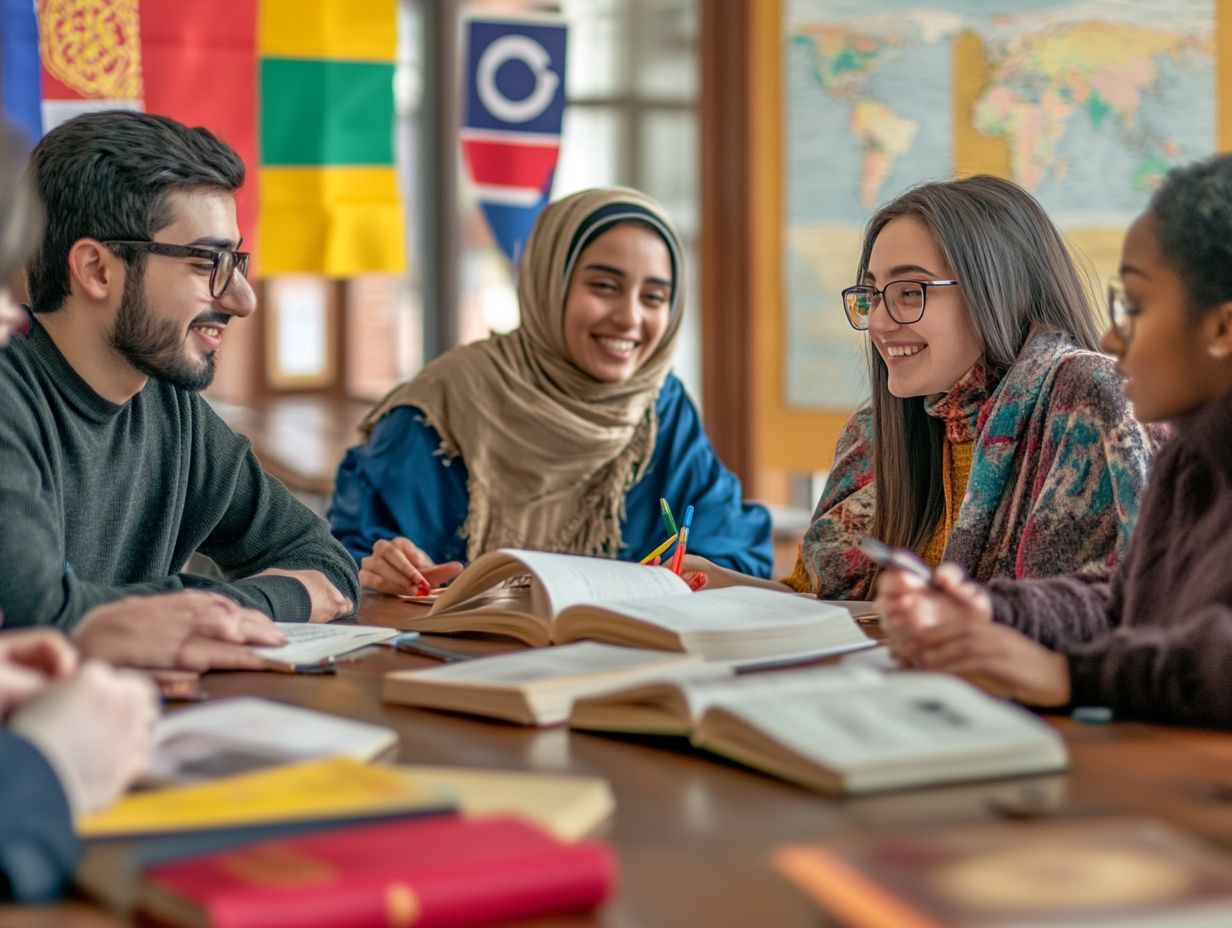
German language courses that include cultural experiences help you learn vocabulary quickly.
Explore traditional music, local art, and historical tours to bring the language to life.
Participating in folk festivals or visiting museums expands your vocabulary and cultural insights.
Language apps enhance your learning by integrating vocabulary related to these cultural activities.
7. Arabic Language Courses with Cultural Tours
Arabic language courses with cultural tours offer a unique chance to practice your skills.
Imagine wandering through ancient sites like Petra and the Masjid al-Haram, soaking in their stories.
Engage with local communities to experience traditions like hospitality and crafts.
Bite-sized lessons help you learn practical vocabulary that fits these vibrant environments.
This blend of exploration and language immersion deepens your appreciation for Arabic culture.
8. Russian Language Courses with Cultural Festivals
Russian language courses that incorporate cultural festivals create a dynamic learning environment. This allows you to practice your language skills in celebratory settings while gaining insights into Russian traditions and customs.
Hands-on experiences, such as music and dance events, offer you the chance to engage with native speakers and observe cultural nuances up close.
By integrating spaced repetition techniques during your online tutoring sessions, you can strengthen your vocabulary and phrases related to these festive occasions. This method enhances your retention and deepens your understanding of the context in which the language is used.
As you dive into the rhythms of Russian folk dances or the rich melodies of traditional music, you ll feel more connected to the language. Each lesson becomes a vibrant blend of cultural appreciation and practical application.
9. Portuguese Language Courses with Cultural Traditions
Portuguese language courses enriched with cultural traditions offer an engaging way to learn the language. You immerse yourself in the vibrant customs and practices of Portuguese-speaking countries.
These courses often introduce you to traditional music genres like Fado and Bossa Nova, letting you explore the emotional storytelling that defines these art forms.
Through dance workshops featuring styles such as Samba and Forr , you gain hands-on experience with the culture, enhancing your vocabulary and conversational skills.
Culinary arts also take center stage, with interactive sessions focused on preparing delightful dishes like Bacalhau Br s and Past is de Nata.
The use of multimedia tools, including video tutorials and interactive cooking classes, makes your learning experience enjoyable and engaging. This helps you connect with the material on a deeper level.
10. Korean Language Courses with Cultural Cuisine
Korean language courses that intertwine cultural cuisine offer a delicious way to connect with the language. This exciting approach lets you quickly absorb vocabulary while enjoying the art of cooking.
In hands-on cooking classes, you engage in experiences that blend language learning with the joy of preparing traditional dishes. Hearing and using culinary terms in these interactive sessions helps expand your vocabulary in a memorable way.
The addition of language apps provides quizzes and audio exercises that reinforce what you practice in the kitchen. This combination of hands-on experiences and digital support creates an engaging environment where you can grasp linguistic nuances while celebrating Korea’s rich culinary heritage.
Why Is It Important to Learn About Culture When Learning a Language?
Understanding culture is crucial in your language learning journey. It enhances your cultural literacy and elevates your immersive language experience, allowing you to communicate more effectively within a community.
With this deeper awareness, you can navigate conversations with greater sensitivity, fostering genuine connections with native speakers. Engaging with music, storytelling, or art helps bridge cultural gaps, making your communication relatable and enjoyable.
These engaging materials also bolster your language retention, providing the context that makes vocabulary and phrases stick. Ultimately, this cultural immersion nurtures your linguistic skills while paving the way for meaningful relationships. This transforms language learning from a task into a rich cultural exchange.
How Do Language Courses Incorporate Cultural Lessons?
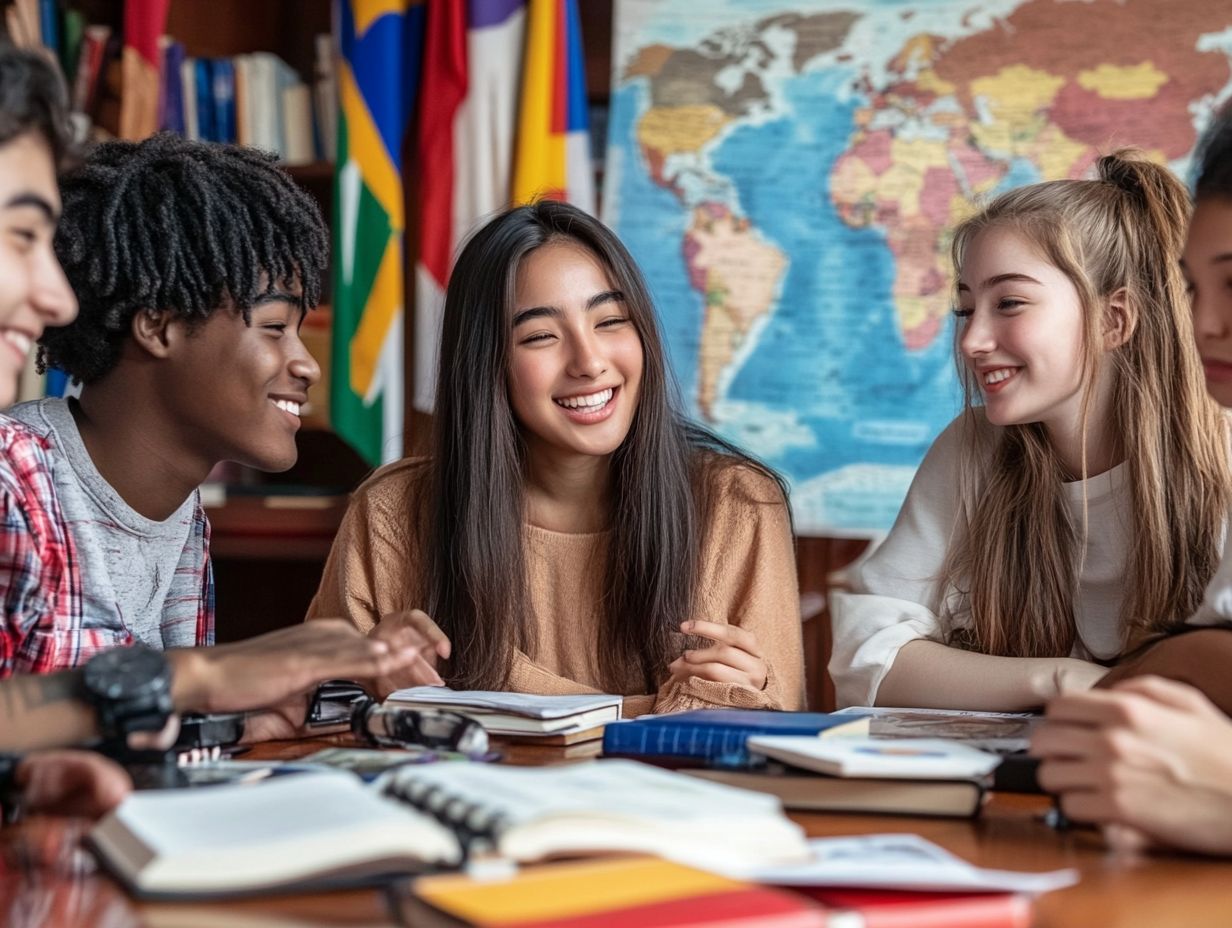
Language courses mix cultural lessons with engaging methods. You ll find interactive tools and community activities that create a rich learning experience.
Instructors enhance this by using multimedia content, like films and music, that reflect the culture of the language you’re studying. This exposure sharpens your language skills and deepens your understanding of societal values.
Online tutoring sessions provide an exciting platform for real-time dialogue. You can practice your skills while exploring cultural nuances with native speakers.
Activities like role-playing and group projects encourage your participation. They immerse you in cultural scenarios, helping you connect more deeply with the language.
What Are the Benefits of Learning a Language and Culture Together?
Learning a language with its culture offers many benefits. You ll gain faster vocabulary acquisition and a more immersive experience.
Research shows that adding cultural context boosts vocabulary retention by as much as 30%. Contextualizing words within cultural narratives makes them relatable.
Immerse yourself in culturally relevant materials like music and films. These deepen your emotional connection to the language.
Engaging with native speakers or attending cultural events creates memorable interactions. This significantly enhances your comprehension and fluency.
How Can Cultural Lessons Enhance Language Learning?
Cultural lessons elevate your language experience by offering essential context. They foster real connections and reinforce your skills through listening practice.
These lessons immerse you in everyday interactions, making language retention meaningful. You can apply your knowledge in real-life situations, deepening your understanding.
For instance, when you practice greetings or ordering food, you engage in practical learning. Interacting with local communities bridges the gap between textbook language and actual usage.
Modern teaching tools like language apps integrate cultural elements. They create interactive experiences that keep you captivated and encourage regular practice.
What Are Some Examples of Cultural Activities in Language Courses?
Cultural activities in language courses are diverse and enjoyable. They range from cooking classes to music festivals, offering immersive experiences.
In cooking classes, you ll learn culinary vocabulary while preparing traditional dishes. This blends language skills with practical learning.
Music festivals expose you to various genres, enhancing your listening skills through lyrics and rhythms. They provide insights into the culture.
Film screenings bring stories to life, reinforcing vocabulary and conversational skills. Discussions about films encourage critical thinking.
These interactive tools motivate you and create a supportive environment. Practicing the language feels natural and enjoyable!
How Can Cultural Understanding Improve Communication Skills?
Cultural understanding is crucial for enhancing your communication skills. It gives you the power to understand social differences and use language effectively.
This deeper awareness allows you to appreciate subtle expressions, such as idioms expressions that have meanings not obvious from the words used and humor, which can vary widely between cultures. For instance, a gesture that shows approval in one culture might be offensive in another.
By recognizing these differences, you can avoid misunderstandings and build authentic connections. When you appreciate the cultural backgrounds of your conversation partners, you naturally become more empathetic.
This ensures that your interactions are respectful and constructive. As a result, your language learning outcomes will improve, strengthening relationships and fostering a collaborative atmosphere.
Frequently Asked Questions
What are the top language courses that include cultural lessons?
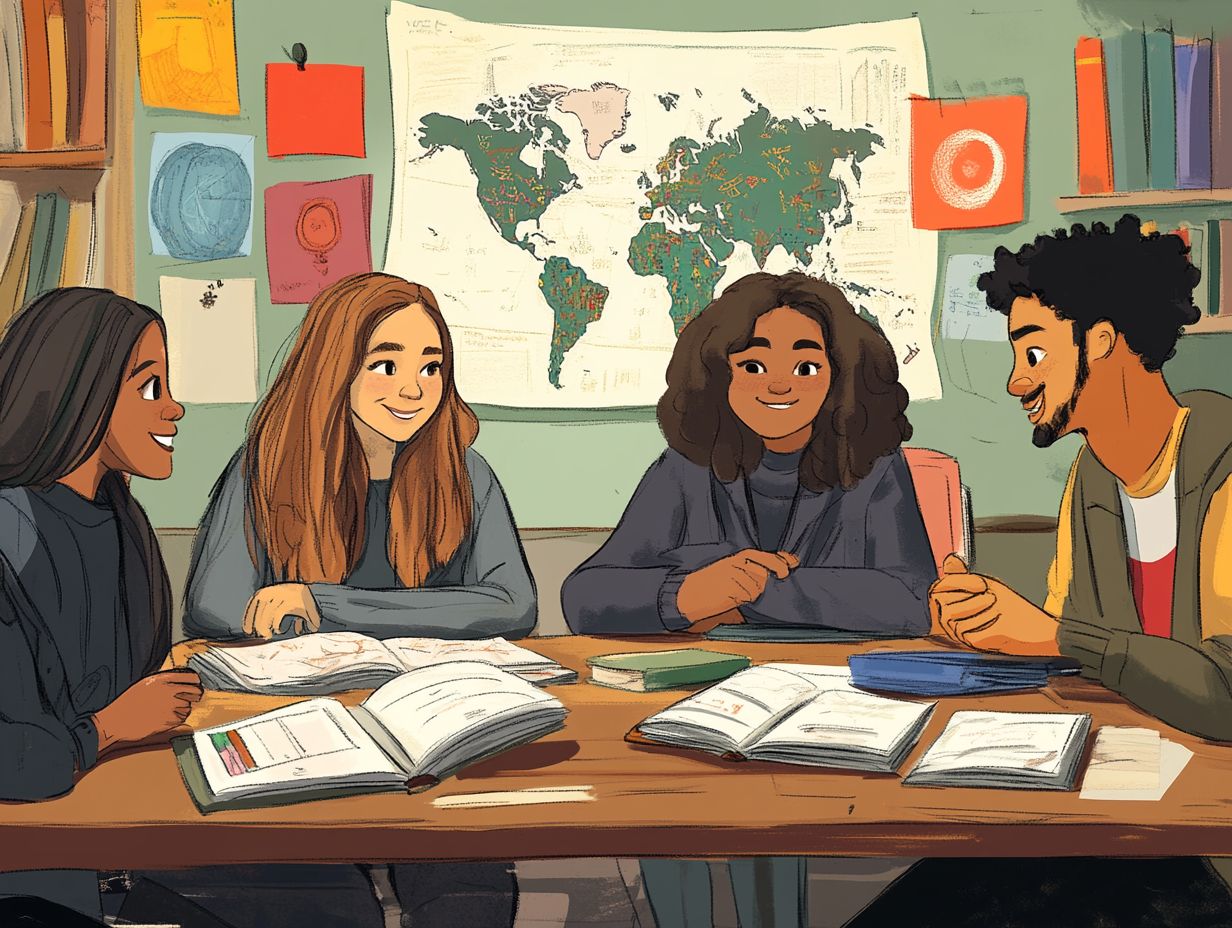
Some of the top language courses that include cultural lessons are Rosetta Stone, Babbel, Duolingo, Pimsleur, Fluenz, and unique language courses you didn’t know existed like Mango Languages.
Why is it important to learn about culture while learning a new language?
Understanding culture helps you fully grasp the language’s context. It also fosters better communication and cultural sensitivity when interacting with native speakers.
Are there any specific cultural lessons included in these language courses?
Yes, these courses cover customs, traditions, holidays, food, history, and social etiquette of the target language’s country or region.
Do these courses offer interactive cultural activities?
Yes, many of these courses provide interactive activities such as virtual field trips and cultural immersion exercises.
Are these courses suitable for beginners?
These courses cater to both beginners and advanced learners. They typically offer various levels of difficulty.
Can I access these courses online?
Most of these language courses are available online, allowing for convenient and flexible learning from anywhere with an internet connection.
Start your language learning journey today!

